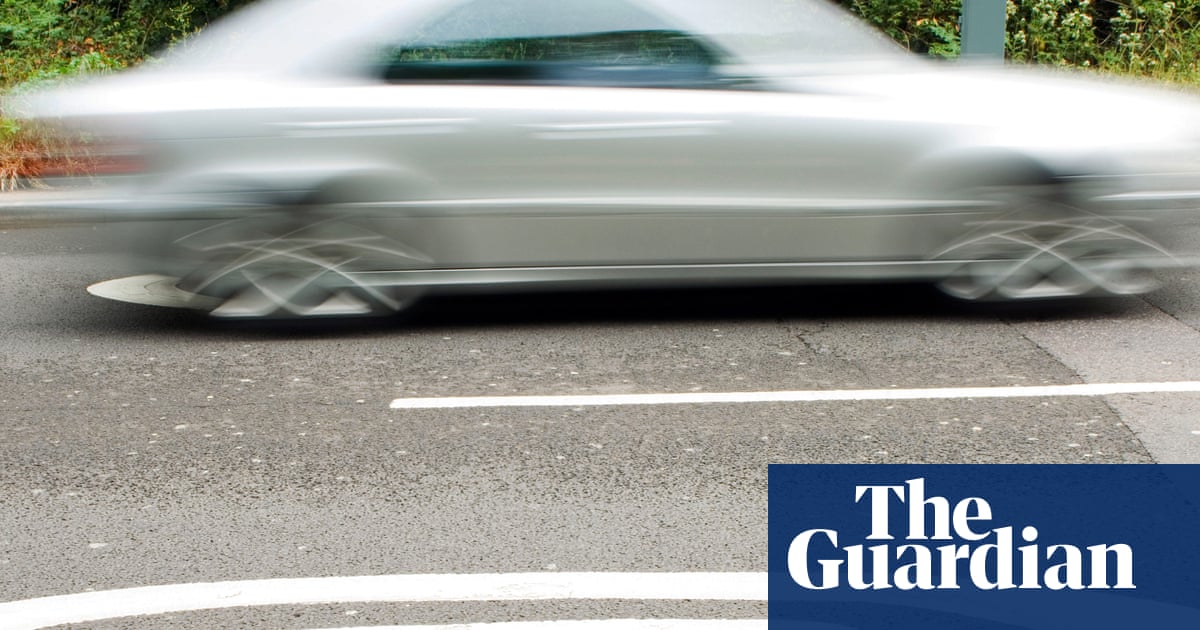All new cars must have the devices from 7 July, adding fuel economy as well as safety. Will mpg become the new mph?
In the highway code and the law courts, there is no doubt what those big numbers in red circles mean. As a quick trip up any urban street or motorway with no enforcement cameras makes clear though, many drivers still regard speed signs as an aspiration rather than a limit.
Technology that will be required across Europe from this weekend may change that culture, because from 7 July all new cars sold in the EU and in Northern Ireland must have a range of technical safety features fitted as standard. The most notable of these is intelligent speed assistance – or colloquially, a speed limiter.
The rest of the UK is theoretically free, as ministers once liked to put it, to make the most of its post-Brexit freedoms, but the integrated nature of car manufacturing means new vehicles here will also be telling their drivers to take their foot off the accelerator. Combining satnav maps with a forward camera to read the road signs, they will automatically sound an alarm if driven too fast for the zone they are in.
Bad thing
Tape over camera will somehow make it from laptop screens to car windshields. Or you can reflash the control units.
I suspect such circumvention will be illegal, and will turn a moderate speeding fine into a much more severe one.
Will mpg become the new mph?
No because Europeans use neither mpg nor mph. 🤭
Will mpg become the new mph?
We don’t use miles here.
edit: article is UK?
My comment on US plans to make impaired driving detectors mandatory also applies to these speed limiters.. I admire the desire to make it safer, but holy shit are car manufacturers going to jump on this opportunity to sell out all of your driving data to insurance companies, causing your rates to randomly double and removing any semblance of privacy, and it will also involve additional parts and sensors that will be as closely corner cut as legally allowed such that it breaks as frequently as possible.
a “safe” idea, sure, do I want it, absolutely not, and I will never trust a corporation to implement it ‘correctly’.
They already sell you all that data sorry to tell ya. Never allow your car to access your contact list unless ya want the manufacturer to sell that data off too
GM tried and failed.
GM stopped selling data to one of their many data customers, and their PR spun it like they stopped collecting and selling your data.
Well, they don’t sell that from me, because I drive a car that’s 31 years old lmfao. No car built past 2014 has any kind of draw for me, specifically because of these kinds of privacy invasions and general corporate bullshittery.
I was wondering when this would finally become a thing. It makes a lot of sense.
It’s already a pretty common feature. My car has a speed limit sign reader and flashes a warning on the screen when you reach the speed limit.
It also has a button to set the car’s speed limiter to the detected speed limit.
It gets it wrong quite frequently though. Sometimes it misses signs and other times it picks up a sign on a side road that goes ahead where the road that you are on turns. I don’t know how it decides to handle national speed limit signs - sometimes it shows a national speed limit sign on the dash but other times it shows 60 or 70 instead.
I like the school zone ones where it shows 15 even though there is no flashing to indicate its 15. It’d need to be smarter to govern by this detection. Perhaps emitting a wireless signal even to make it harder to miss?
My car happily understands 10tonn signs as 10km/h limit, or pedestrian crossings as motorway (130km/h max). It also hss zero awareness if a speed limit is still relevant (eg have we passed an intersection since).
I don’t have high trust in this tech currently.
Yeah they are passing laws before the tech has caught up.
Which would be first. Usually it’s the other way around, delayed by years of deaths.
Now if we could just get them to understand they need to listen to the tech experts.
Not for us plebs stuck in the past with our old vehicles 😅
Better late than never.
In this case I prefer never.
So you would rather wield 2 tonnes of steel at a higher speed than allowed and risk others lives?
Too many places set arbitrarily low speed limits (at least when talking about highways and freeways) because they want to increase revenue by handing out speeding tickets. Oftentimes, people driving too slow are way more of a danger to everyone than someone driving over the limit.
For example my state limits freeway speeds to >10MPH below every state bordering us. How can it be ‘unsafe’ to drive over 65MPH in one state but after crossing an imaginary line in the road it’s suddenly perfectly safe to be driving 75MPH?
I won’t argue that speeding in residential or pedestrian-heavy downtown areas is smart or safe, but a lot of the limits imposed on us are BS.
Yes. As long as we have moronic speed limits from the 60’ in place, 100% yes.
I like how we collectively create nanny-states, then turn around and bitch when the cops have too much power. I hate how there really isn’t any good solution to many problems because of the human factor.
Hard to accuse the state of being a nanny when so many act like children. Being a child is fine, but not when driving a 2,000kg object at speed.
I don’t see why nanny-state can’t be nanny about cops. You can both apply speed limiters and hold cops accountable for their actions.
“Hard to argue against”
No, it’s really quite easy to argue against them.
I live in a rural area. If I call an ambulance, that’s a minimum–minimum–of 20 minutes for any ambulance to get to me. Then it’s another 20 minutes to get to an emergency room. I know someone who is a doctor that lives close to me, and their husband got stung by a bunch of yellow jackets. Their husband is allergic. They gave their husband a shit ton of meds, and made it to the ER in under 15 minutes. As it was, he barely avoided getting put on a ventilator, and that was with perfect care and driving 90+ mph on two lane mountain roads to get to a hospital. (He has an epinephrine pen now.) With a “smart” speed limiter on their car? He wouldn’t have been breathing by the time they got to the ER.
When you live in a rural area, and emergency help is a long way away (honestly, 20 min ain’t that bad compared to other parts of the state where it can be more like 45+ minutes just to get an ambulance out), it’s really, really easy to argue against that kind of nanny state nonsense.
Presumably ambulances and other such emergency vehicles would be exempt from such devices? But I agree with you anyway since ambulances are expensive and having to choose between driving slow in your own car with a limiter and calling for an ambulance and going bankrupt should not be a choice someone has to make in a split second during an emergency.
Presumably ambulances and other such emergency vehicles would be exempt from such devices?
Okay, but that misses the point.
This doctor was driving at the speeds that an ambulance would have been driving, but only had to make the trip in one direction. It took them 20 minutes, from stings, to pulling into the ER (15 minutes of that being driving time). If they had called an ambulance, it would have been a minimum of 30-40 minutes, because the ambulance would have to get to them first.
And again - 20 minutes for an ambulance to get to you is not all that bad, relative to even more rural areas, and counties that don’t even have a hospital or doctors.
But the ambulance carries epipens and would have administered one immediately.
The drive to the hospital would have been precautionary and at a SAFE speed…
…If–and this is a big “if” in very rural areas–the ambulance has someone on it that can legally administer drugs, and the ambulance isn’t on the other side of the county dealing with another medical emergency at the same time. (In my state, you need to be a paramedic to administer drugs; there are different classes of EMTs in my state, and most of them are not paramedics. There’s a severe shortage of paramedics, largely due to the god-awful pay, and so not all ambulances will have a paramedic on them at all times.)
This was literally a best-case scenario: a doctor that had medications on-hand and could administer them, and able to get to the hospital faster than an ambulance could get to their home in the first place. And he still came very close to needing to be intubated.
Everyone can administer a epipen… And if you’re going to play “IF”…
The ambulance could also have been two houses down and there in 3 minutes. Or the more likely IF, the driver of the car, could have wrecked injuring them and likely killing the patient, or even worse injured another car’s passengers…
Great now explain how this works in every other type of medical emergency because for some reason only ambulances and EMTs are capable of driving fast safely.
The ambulance could also have been two houses down and there in 3 minutes.
That’s significantly less likely than the ambulance being either at the hospital or being farther away than the hospital. Let’s say that 33% of the time the ambulance is at the hospital, 33% of the time it’s farther away, and 33% of the time it’s closer. That means that 66% of the time it’s going to take you less time to get to the hospital on your own than it would to wait for an ambulance.
…And that’s only one specific type of medical emergency. What about uncontrolled bleeding? You want a real world example? Look at Kentucky Ballistics; he had a gun explode, and a piece of shrapnel went into his neck. If he had waited for an ambulance, he would have bled out before he made it to the hospital, and he was only about ten minutes away.
And that’s just one example of a medical emergency. A simple Epi-pen isn’t going to save you when you’re having a stroke, heart attack, or bleeding internally.
I 100% agree, I only brought up ambulances being exempt because you specifically mentioned them. I gather from your post that the value of ambulances in rural areas is probably less valuable than in urban areas simply because the main selling point of an ambulance is that it has right of way to overtake all traffic and ignore signals, but traffic is not the main issue, it’s long distances between hospitals or difficult terrain/winding roads that artificially limit speeds.
In the very rural areas I would assume there to be ambulance/rescue helicopters, boats and snowmobiles etc that get dispatched. I was born and lived most of my life in a very rural area with the closest actual hospital with proper 24/7 er and more advanced surgery etc capabilities being some 160km away. Roads and road-bound vehicles just aren’t a thing you’d want to use or depend on in an emergency, if you live that rurally. So that’s really not a good argument to make, in my opinion, though maybe if you lived in the US, you wouldn’t have that and if you did, it’d bankrupt you if you made use of it, so you were going to be fucked either way. It’s dangerous to depend on rural roads if your only recourse is speeding. That’s just endangering everyone else too, be it only you as the driver the extra casualty. So the answer isn’t keeping the current dangerous system dangerous, rather maybe reconsider the way emergency response and general welfare and healthcare is organized and structured… if something like this would one day push you guys there, then I’d consider that only good. This is assuming you are from US of course. But I can’t really see any other country lacking basic services and needs like that, if internet and proficiency in English language as well as access to cars is taken as granted, which would mostly rule out third world countries since we are talking about rural areas.
rescue helicopters
That, in particular, is especially fucked in the US. Life Flights/medevac helicopters are almost always private companies, and each insurance company has to negotiate with every medevac company separately. You can easily end up with a $100,000 bill from a helicopter ride to a trauma center because your insurer didn’t negotiate rates with the one company that was operating in your area, and you have no legal recourse aside from declaring bankruptcy.
Should we have socialized or otherwise single-payer medicine in the US? Absolutely. But are we realistically going to do that before some id10t decides to legislate ‘smart’ cars that prevent you from exceeding what the car believes to be the speed limit? Nope. (For reference, I’ve driven a car with driver assist; it tried to jerk the wheel out of my hands a few times because it thought the road was turning when it wasn’t, because it was misreading the lines on the road and the signs.)
An ambulance is a truck, and handles like one, they won’t be going as fast as a car on a two-lane mountain road - it isn’t possible to keep it on the road with perfect driving at speeds a small car can go. (an ambulance could be made smaller, but that is at the expensive of equipment they have inside so not a great compromise.)
Ambulances are expensive? Tell me you are from the USA, without telling me you are from the USA.
An Ambulance is expensive anywhere in the world. The only question is how do you hide the expensive. Most of the cost is having several vehicle with trained personal sitting around doing nothing just waiting for someone in need. If there is ever a time when there is one vehicle not ready to go but doing nothing you don’t have enough service for a potential worse disaster. Of course that means there is lots of room to hide the costs if you don’t want to tell the truth - which many do not.
When I took an ambulance, they charged me $1800 (after insurance) for a 10-minute ride to the hospital. That covers a lot of “sitting around” time for a group of people earning $15/hr. Just 10 calls in one day is close to $20k in revenue, or close to four months worth of pay for those two EMTs, and that ambulance is running 24/7.
I am. It’s a real fuckin’ problemo. Ambulances are actually kinda rare to see these days because people around where I live call rideshares to take them to the hospital instead.
This is the best summary I could come up with:
Technology that will be required across Europe from this weekend may change that culture, because from 7 July all new cars sold in the EU and in Northern Ireland must have a range of technical safety features fitted as standard.
The rest of the UK is theoretically free, as ministers once liked to put it, to make the most of its post-Brexit freedoms, but the integrated nature of car manufacturing means new vehicles here will also be telling their drivers to take their foot off the accelerator.
Safety is the overriding reason for slower speeds, and as charities such as Brake and Rospa emphasise, even small increases above 30mph make a significant difference in outcomes, particularly for those who are not driving the car.
Yousif Al-Ani, the principal engineer for advanced driver assistance systems (ADAS) at Thatcham Research, says: “Modern vehicles are very good at protecting occupants in the event of a collision through passive safety features, such as airbag and crumple zones, but these have limited benefit to vulnerable road users” such as pedestrians and cyclists.
With the precise readings of computers replacing wobbly speedometer needles, however, and a new generation of speed cameras upping the ante on the enforcement side, it may be ever harder to disown responsibility.
Questions remain over whether the technology works well enough in all real-life situations, and how comfortable people will feel with their car telling them what to do, let alone taking control of their steering, brakes and acceleration – a potentially alarming and disorienting experience.
The original article contains 924 words, the summary contains 254 words. Saved 73%. I’m a bot and I’m open source!
This sounds like blown up bullshit.
How does this speed limiter work exactly, I don’t see that mentioned anywhere.
If I drive Autobahn it’s not the same as driving passed a school in the city. How does the speed limiter know the speed limit?
To know that accurately, sounds like a somewhat expensive mandatory piece of equipment.
And how come I have heard absolutely zero about this from either car reviewers or local news media?I looked it up for my country (Denmark), these are NOT mandatory that I can find, and they can ONLY be installed by public authorized shops, and from the paperwork required, it seems like the installer decides the limit, there are no mandatory limits.
So it seems like the whole story is bullshit.
EDIT:
Intelligent speed assistance seems to be a thing, but this is a pretty crucial part:
The ISA system is required to work with the driver and not to restrict his/her possibility to act in any moment during driving. The driver is always in control and can easily override the ISA system.
From the OP the Guardian article:
Drivers of most new cars will be familiar with similar features already installed, but they are currently easy to override.
Yes and that’s how it will continue to be with Intelligent speed assistance.
Article is bullshit these are NOT speed limiters, which is a completely different thing, despite that I can see numerous articles in English erroneously calling this speed limiters, when it’s nothing of the sort.
Otherwise, what’s an ACTUAL speed limiter called? You know like what is popular in many new cars, that have speed limiters that prevent you from driving faster than for instance 160 km/h.
Well it will be harder to argue against fines etc. you where warned and either ignored the warning or disabled the warning and accepted the risk.
With the height of fines in some countries…
I’d imagine the next step will the even stricter measurements, harsher fines and more SPECS.
In Canada we call them engine governors and they’ve been around for decades (mostly on semis/tractor trailer units).
I know most Mercedes cars have had speed limiters for many years, but those were traditionally at 250 km/h.
An engine governor sounds more like preventing revving it to high.A classic example is a centrifugal governor, also known as the Watt or fly-ball governor
This describes an engine revving governor, exactly as it sounds like, such a mechanism will not limit the speed of a car, but limit the revolutions on the engine. Probably to prevent damage to the engine.
In the US, a device that sets max speed for a vehicle is called a governor. They’re on cement mixers and things like that
“Combining satnav maps with a forward camera to read the road signs, they will automatically sound an alarm if driven too fast for the zone they are in.”
“From now on, however, cars will be designed with systems that are impossible to permanently turn off, restarting each time the engine does. Will car lovers see this as pure progress?”
It doesn’t sound hard to disable… speakers only have 2 wires. Snip-Snip.
You aren’t disabling the system, that still works fine, it just has no output.
IIRC it’s not an audio alarm, the car will push back on the pedal so that if you push past the limit it will need a bit more force.
And even if they were just speakers, they would most likely be the main speakers, so you’d be taking out your sound system.
Just quoting the article:
“Combining satnav maps with a forward camera to read the road signs, they will automatically sound an alarm if driven too fast for the zone they are in.”
I read the original paper a few months ago, actually manufacturers can choose between an auditory warning, vibrating the wheel, pushing back on the pedal, or outright slowing the car down.
You’re right ofc, I remembered this on vaguely.
My dad got something similar build into his car, its wrong so many times especially when road signs are confusing at construction sites.
Example: Construction site limits speed to 60kmh and there is an exit coming up that goes through the actual construction site, that has a speed limit on the the exit of 30kmh, guess what. The car sees the 30kmh sign but doesnt understand its only for cars exiting but alarms the driver now until.the next 60kmh sign.
So in order for this to work properly road signs have to be normalized all around the EU, which i don’t see happening anytime soon.
Worse is the other way around, but if you then speed because the system doesn’t work, it’s of course still your own fault.
I know why they want it and I mostly agree, but they’re massively downplaying the reliability concerns, saying it is “usually correct” (It’s not) and “data will improve”, conveniently ignoring that these underlying systems aren’t new and the data has consistently sucked over its entire lifetime. They don’t provide a target date by which they want this data to be available, so it will never be.
Anecdotally, on a 30km drive, my car (which receives updates to nav data over cellular) is wrong 5-10 times, in both directions.
I didn’t see anywhere in the article how this will be implemented. Are we sure it uses sign recognition as opposed to GPS or some other method?
My car uses a mix of GPS and camera, and I’m using Android Auto, which uses only GPS. There are several cases where both are wrong either
- because the camera got confused by signs
- the GPS data are not up to date
So yeah that’s going to be fun… Like my car telling me I should drive a 30 limit instead of 110 on the highway (did happen several times)
Gps will never know accidents, construction or anything alike that is temporary
Cops in America will hate this tech. All of that ticket revenue will go out of the window.
Exactly why won’t take root there
I’d be fine with this being in my car. I’ve been in too many situations where I wasn’t sure what the speed limit was.
Pay attention when driving. Driving should be the only thing you do when operating a vehicle…
Paying attention when driving will not make speed limit signs appear when there aren’t any.
Alternatively, that same functionality could be used to tell you what the speed limit is. My cars GPS will display the speed limit on the map if it knows it. It’s great to get the extra info, and nothing is controlling my car
My phone’s GPS does the same thing. But not always.













